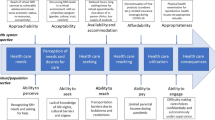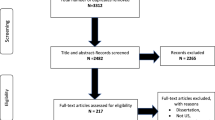Abstract
Little is known about how social factors influence vulnerability to, and consequences of, HIV infection among men who have sex with men (MSM) in South Africa. This study aimed to analyse social stratification and its links with HIV among MSM in Cape Town, South Africa. Six interviews and six focus group discussions (n = 25) were conducted. Tools were based on the World Health Organisation’s Commission on the Social Determinants of Health framework. Directed content analysis was used to analyse data. Race and education were directly linked to social position. MSM from lower social positions were more vulnerable to HIV, and had more negative consequences of HIV infection, compared to wealthier MSM. Engagement with community leaders, health workers and police to promote inclusion could reduce vulnerability of MSM to HIV. Increased access to free, non-discriminatory HIV-related services would reduce inequities in access to HIV services by MSM.

Similar content being viewed by others
Notes
“Coloured” is a recognised South African racial group and refers to people of mixed Black/African, European, and/or Asian ancestry.
References
Baggaley, R. F., White, R. G., & Boily, M.-C. (2010). HIV transmission risk through anal intercourse: systematic review, meta-analysis and implications for HIV prevention. International Journal of Epidemiology,. doi:10.1093/ije/dyq057.
Baral, S., Burrell, E., Scheibe, A., Brown, B., Beyrer, C., & Bekker, L.-G. (2011). HIV risk and associations of HIV infection among men who have sex with men in Peri-Urban Cape Town, South Africa. BMC Public Health, 11(1), 766. doi:10.1186/1471-2458-11-766.
Beyrer, C., Baral, S., Kerrigan, D., El-Bassel, N., Bekker, L.-G., & Celentano, D. D. (2011). Expanding the space: inclusion of most-at-risk populations in HIV prevention, treatment, and care services. Journal of Acquired Immune Deficiency Syndromes, 57(Suppl 2), S96–S99. doi:10.1097/QAI.0b013e31821db944.
Burrell, E., Mark, D., Grant, R., Wood, R., & Bekker, L.-G. (2010). Sexual risk behaviours and HIV-1 prevalence among urban men who have sex with men in Cape Town, South Africa. Sexual Health, 7(2), 149–153. doi:10.1071/SH09090.
Cloete, A., Simbayi, L. C., Kalichman, S. C., Strebel, A., & Henda, N. (2008). Stigma and discrimination experiences of HIV-positive men who have sex with men in Cape Town, South Africa. AIDS Care, 20(9), 1105–1110. doi:10.1080/09540120701842720.
Cloete, A., Simbayi, L., Rehle, T., Jooste, S., Mabaso, M., Townsend, L., et al. (2014). The South African Marang Men’s Project: HIV bio-behavioural surveys using respondent-driven sampling conducted among men who have sex with men. Cape Town: HSRC Press.
Commission on Social Determinants of Health. (2008). Closing the gap in a generation: health equity through action on social determinants of health. Final Report of the Commission on Social Determinants of Health. Final Report of the Commission on Social Determinants of Health. Geneva: World Health Organization.
Goyer, K. C., Saloojee, Y., Richter, M., & Hardy, C. (2004). HIV/AIDS in prison: Treatment, intervention, and reform. AIDS Law Project: Submission to the Jali Commission. Johannesburg.
Jobson, G., de Swardt, G., Rebe, K., Struthers, H., & McIntyre, J. (2013). HIV risk and prevention among men who have sex with men (MSM) in peri-urban townships in Cape Town, South Africa. AIDS and Behavior, 17(Suppl 1), S12–S22. doi:10.1007/s10461-012-0328-5.
Kalichman, S. C., Simbayi, L. C., Jooste, S., Cherry, C., & Cain, D. (2005). Poverty-related stressors and HIV/AIDS transmission risks in two South African communities. Journal of Urban Health, 82(2), 237–249. doi:10.1093/jurban/jti048.
Knox, J., Sandfort, T., Yi, H., Reddy, V., & Maime, S. (2011). Social vulnerability and HIV testing among South African men who have sex with men. International Journal of STD and AIDS, 22, 709–713. doi:10.1258/ijsa.2011.010350.
Lane, T., Mogale, T., Struthers, H., McIntyre, J., & Kegeles, S. M. (2008a). “They see you as a different thing”: the experiences of men who have sex with men with healthcare workers in South African township communities. Sexually Transmitted Infections, 84(6), 430–433. doi:10.1136/sti.2008.031567.
Lane, T., Shade, S. B., McIntyre, J., & Morin, S. F. (2008b). Alcohol and sexual risk behavior among men who have sex with men in South african township communities. AIDS and Behavior, 12(4 Suppl), S78–S85. doi:10.1007/s10461-008-9389-x.
McDermott, E., Roen, K., & Scourfield, J. (2008). Avoiding shame: young LGBT people, homophobia and self-destructive behaviours. Culture, Health & Sexuality, 10(8), 815–829. doi:10.1080/13691050802380974.
Meng, X., Zou, H., Fan, S., Zheng, B., Zhang, L., Dai, X., et al. (2014). Relative risk for HIV infection among men who have sex with men engaging in different roles in anal sex: A systematic review and meta-analysis on global data. AIDS and Behavior, 19(5), 882–889. doi:10.1007/s10461-014-0921-x.
Rispel, L. C., Metcalf, C., Cloete, A., Moorman, J., & Reddy, V. (2011a). You become afraid to tell them that you are gay: health service utilization by men who have sex with men in South African cities. Journal of Public Health Policy, 32(s1), S137–S151. doi:10.1057/jphp.2011.29.
Rispel, L., Metcalf, C. A., Cloete, A., Reddy, V., & Lombard, C. (2011b). HIV prevalence and risk practices among men who have sex with men in two South African cities. Journal of Acquired Immune Deficiency Syndromes, 57(1), 69–76. doi:10.1097/QAI.0b013e318211b40a.
SACEMA. (2009). The modes of transmission of HIV in South Africa. Report. SACEMA: Stellenbosch.
Seale, A. (2009). Heteronormativity and HIV in sub-Saharan Africa. Development, 52(1), 84–90. doi:10.1057/dev.2008.76.
Shisana, O., Rehle, T., Simbayi, L., Zuma, K., Jooste, S., Zungu, N., et al. (2014). South African National HIV prevalence, incidence and behaviour survey, 2012. Cape Town: HSRC Press.
South African National AIDS Council. (2011). The HIV epidemic in South Africa : What do we know and how has it changed? Program. Pretoria: South African National AIDS Council.
Statistics South Africa. (2014). South Africa mid-year population estimates 2014. Pretoria: Statistics South Africa.
Tucker, A., de Swardt, G., Struthers, H., & McIntyre, J. (2013). Understanding the needs of township men who have sex with men (MSM) health outreach workers: Exploring the interplay between volunteer training, social capital and critical consciousness. AIDS and Behavior, 17(Suppl 1), S33–S42. doi:10.1007/s10461-012-0287-x.
University of California San Francisco. (2015). MSM in South Africa. Data triangulation project. San Francisco: University of San Francisco Global Health Sciences.
Wilkinson, R. (2005). The impact of inequality. How to make sick societies healthier. New York: Routledge.
Acknowledgments
The financial assistance of the National Research Foundation (NRF) (via the South African Research Chair in ‘Health and Wealth’) towards this research is hereby acknowledged. Opinions expressed and conclusions arrived at, are those of the author and are not necessarily to be attributed to the NRF. Funding from the Oppenheimer Memorial Trust is also acknowledged. Without the insights and knowledge of participants this research would not have been possible. Participant sampling was enabled by staff from The Inner Circle, The Triangle Project, Desmond Tutu HIV Foundation, Cape Town Pride Shelter and the Anova Health Institute.
Funding
The financial assistance of the National Research Foundation (NRF) (via the South African Research Chair in ‘Health and Wealth’) towards this research is hereby acknowledged. Opinions expressed and conclusions arrived at, are those of the author and are not necessarily to be attributed to the NRF. Funding from the Oppenheimer Memorial Trust is also acknowledged.
Author information
Authors and Affiliations
Corresponding author
Ethics declarations
Conflict of interest
The authors declare that they have no conflict of interest.
Ethical Approval
All procedures performed in studies involving human participants were in accordance with the ethical standards of the institutional and/or national research committee and with the 1964 Helsinki declaration and its later amendments or comparable ethical standards.
Informed Consent
Informed consent was obtained from all individual participants included in the study.
Rights and permissions
About this article
Cite this article
Scheibe, A., Orleyn, R., Ekström, A.M. et al. Social Determinants of HIV Among Men Who Have Sex with Men in Cape Town. Sexuality & Culture 20, 579–601 (2016). https://doi.org/10.1007/s12119-016-9344-3
Published:
Issue Date:
DOI: https://doi.org/10.1007/s12119-016-9344-3




